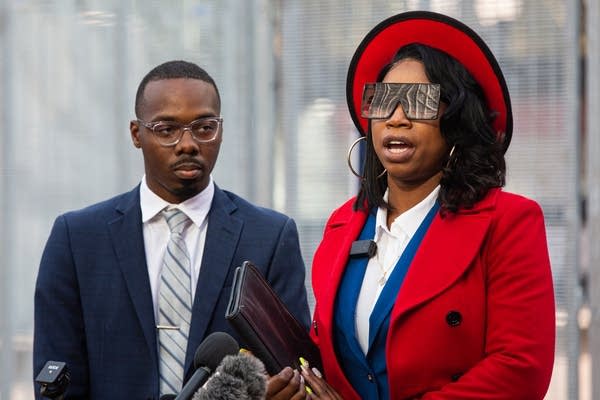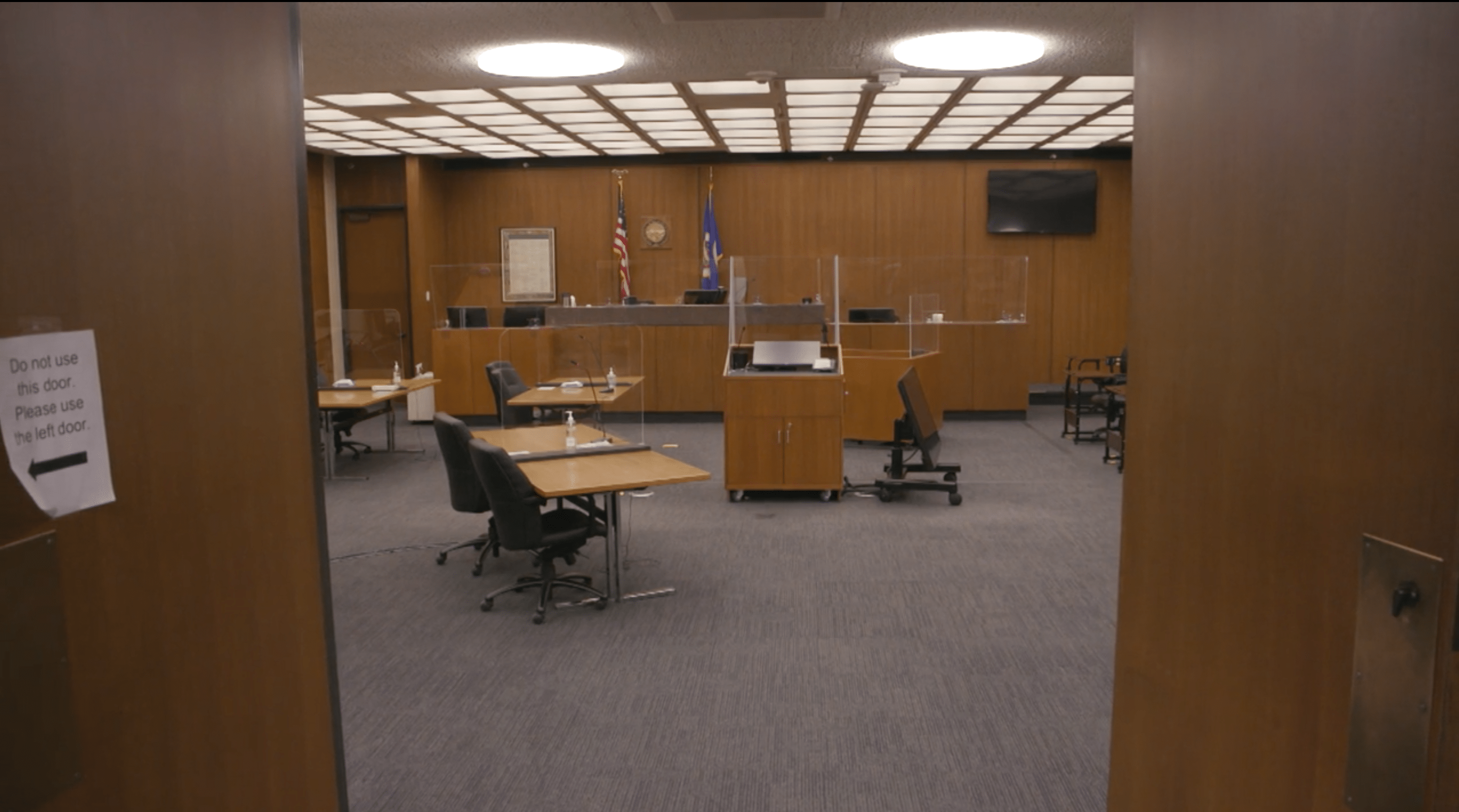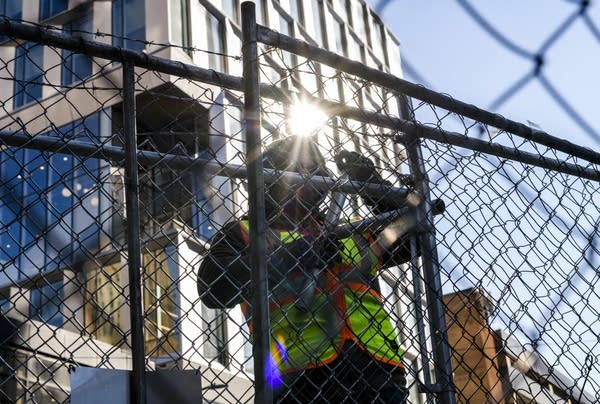Chauvin trial: Jury pool sent home; focus turns to appeals court ruling
Court adjourned for Monday

Go Deeper.
Create an account or log in to save stories.
Like this?
Thanks for liking this story! We have added it to a list of your favorite stories.
Watch the livestreamed coverage of the trial on MPR News’ Facebook. Some images or material discussed during the proceedings may be disturbing to many viewers.
Court is adjourned for Monday.
Updated: 7:51 p.m.
Hours after sending potential jurors home, the judge overseeing the trial of former Minneapolis police officer Derek Chauvin said he plans to proceed with jury selection on Tuesday — even as he awaits a decision from the state appeals court on whether the proceedings can begin.
What should have been the trial’s first day got to a slow start because of some legal maneuvering in the courtroom. At issue is the possible reinstatement of a third-degree murder charge against Chauvin in the killing of George Floyd.
Turn Up Your Support
MPR News helps you turn down the noise and build shared understanding. Turn up your support for this public resource and keep trusted journalism accessible to all.
The appeals court on Friday ordered Hennepin County District Judge Peter Cahill to consider adding the charge. Defense attorneys say they'll appeal that decision to the state Supreme Court.
Prosecutors on Monday argued that going forward with jury selection while the appeal is being considered could be problematic. Matthew Frank, an assistant state attorney general, told the court that prosecutors were concerned proceeding now could lead to a reversal of a conviction later on.
“This court would be making decisions about jurors for a trial about which we don’t know what the exact charges are going to be yet,” Frank said.
Defense attorney Eric Nelson argued that the court could take up limited motions and jury selection despite the appeal.
Much of the trial’s first day went to working through housekeeping motions governing the trial, including evidence and witness subpoenas.
Among the decisions made, prosecutors and defense attorneys:
Struck 16 potential jurors based on the questionnaires they filled out.
Agreed that witnesses will not be allowed to watch the trial’s livestream after they've testified in case they're called back in. (This does not apply to expert witnesses.)
Agreed that wording like "the victim" or "the accused" may not be used. Testimony of guilt or innocence is not allowed, either.
Nelson on Monday again argued to allow a 2019 arrest of Floyd into evidence, alleging that Floyd ingested drugs when police approached him then. He said the cause of death and whether drugs contributed to it, will come up during this trial.
Cahill, however, said he was not convinced of its relevance because Chauvin was not involved in the earlier arrest nor did he have any knowledge of it.
George Floyd's sister, Bridgett Floyd described the first day of the trial as an emotional roller coaster but said her family is relieved the trial has begun.
"I will say that my family and I are glad the wait is finally over and the day is here,” she told a large gaggle of local, national and international media outside the Hennepin County Courthouse Monday. "We are praying for justice. Our hope is that justice prevails and we can all use this as an opportunity to be better and do better for those around us."

Because of COVID-19, only one family member is allowed in court per day from the Floyd family and for the defendant. Bridgett Floyd thanked supporters and asked for continued prayers for the Floyd family. She refrained from talking about the trial itself.
The judge plans to move forward with jury selection at 9 a.m. Tuesday unless the state appeals court orders him to halt the proceedings. Motions from both parties will be considered starting at 8 a.m.
Chauvin faces charges of second-degree unintentional murder and second-degree manslaughter in Floyd’s death.
For the latest trial news, follow MPR News reporters Brandt Williams and Jon Collins on Twitter.
Watch a recording of Monday morning’s trial proceedings here.
MPR News reporter Nina Moini contributed to this story.
Trial basics

Who’s who: A look at the key players in the trial
Need to know. 14 key questions about the trial, answered
Jury selection: The complex process to pick jurors who will weigh charges fairly
MPR News on its coverage: Ahead of Chauvin’s trial, Nancy Lebens, the newsroom’s deputy managing editor, answered audience questions about our reporting plans
George Floyd and his legacy

Remembering George Floyd, the man: Before he became a symbol in the fight for racial justice, friends say Floyd was a “gentle giant” who sought a fresh start.
Making George Floyd Square: Here’s how the site of Floyd’s killing — 38th Street and Chicago Avenue in Minneapolis — is being reshaped.
Calls for change: Here’s what some Floyd activists tell MPR News about their experiences with race in Minnesota, why they march and what they hope for the future.
Read more

Minnesota’s reckoning with race and policing was many years in the making: George Floyd’s killing touched off a worldwide reckoning on racial justice and law enforcement, building on the outrage that had grown with each high-profile police killing in recent years.
After Floyd’s killing, police reform efforts not fast or far enough for some: Minneapolis leaders and state lawmakers want changes they say will boost officer accountability and public trust, but not everyone agrees.
Protesters criticize Minneapolis' fortifications ahead of Chauvin trial: Mayor Jacob Frey said the large security presence is not meant to thwart peaceful protests, but to protect people and property. One activist said city leaders are sending the wrong message.
St. Paul police lead training to protect firefighters during mass demonstrations: Firefighters had trouble responding to buildings on fire because of the volatile situation around them.




